Fast Food & the Obesity Epidemic
Understanding Obesity
Big Portions, Big Problems
Discrimination & Prejudice
Emotions & Eating
Exercise for Fitness & Weight Loss
Fast Food & the Obesity Epidemic
Health Issues Caused by Obesity
Looking & Feeling Good in Your Body
Nature & Nurture: The Causes of Obesity
No Quick Fix: Fad Diets & Weight-Loss Miracles
Surgery & Medicine for Weight Loss
Fast Food & the Obesity Epidemic
Autumn Libal
Mason Crest
Mason Crest
450 Parkway Drive, Suite D
Broomall, PA 19008
www.masoncrest.com
Copyright 2015 by Mason Crest, an imprint of National Highlights, Inc. All rights reserved. No part of this publication may be reproduced or transmitted in any form or by any means, electronic or mechanical, including photocopying, recording, taping, or any information storage and retrieval system, without permission from the publisher.
Printed in the United States of America.
Series ISBN: 978-1-4222-3056-5
ISBN: 978-1-4222-3061-9
ebook ISBN: 978-1-4222-8844-3
Cataloging-in-Publication Data on file with the Library of Congress.
Contents

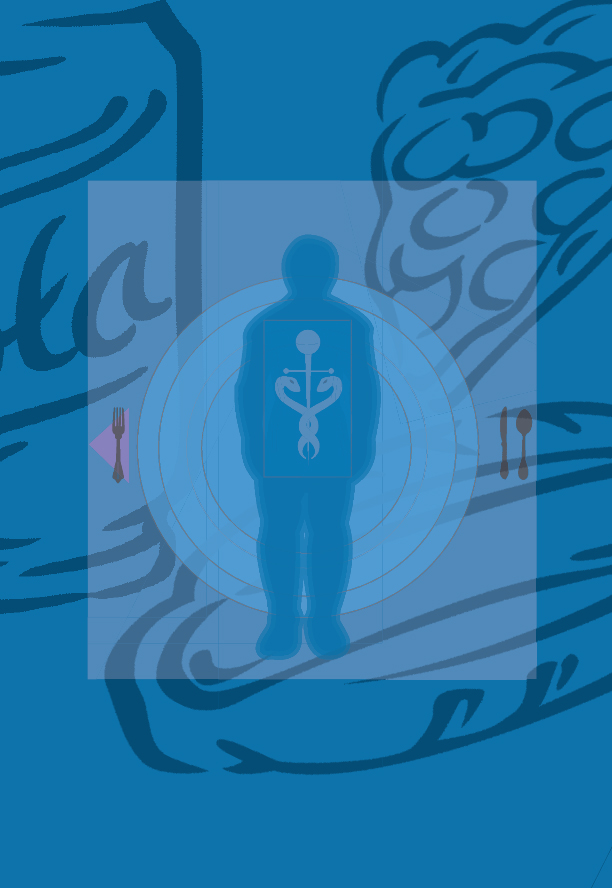
We as a society often reserve our harshest criticism for those conditions we understand the least. Such is the case with obesity. Obesity is a chronic and often-fatal disease that accounts for 300,000 deaths each year. It is second only to smoking as a cause of premature death in the United States. People suffering from obesity need understanding, support, and medical assistance. Yet what they often receive is scorn.
Today, children are the fastest growing segment of the obese population in the United States. This constitutes a public health crisis of enormous proportions. Living with childhood obesity affects self-esteem, employment, and attainment of higher education. But childhood obesity is much more than a social stigma. It has serious health consequences.
Childhood obesity increases the risk for poor health in adulthood and premature death. Depression, diabetes, asthma, gallstones, orthopedic diseases, and other obesity-related conditions are all on the rise in children. Over the last 20 years, more children are being diagnosed with type 2 diabetesa leading cause of preventable blindness, kidney failure, heart disease, stroke, and amputations. Obesity is undoubtedly the most pressing nutritional disorder among young people today.
This series is an excellent first step toward understanding the obesity crisis and profiling approaches for remedying it. If we are to reverse obesitys current trend, there must be family, community, and national objectives promoting healthy eating and exercise. As a nation, we must demand broad-based public-health initiatives to limit TV watching, curtail junk food advertising toward children, and promote physical activity. More than rhetoric, these need to be our rallying cry. Anything short of this will eventually fail, and within our lifetime obesity will become the leading cause of death in the United States if not in the world.
Victor F. Garcia, M.D.
Founder, Bariatric Surgery Center
Cincinnati Childrens Hospital Medical Center
Professor of Pediatrics and Surgery
School of Medicine
University of Cincinnati
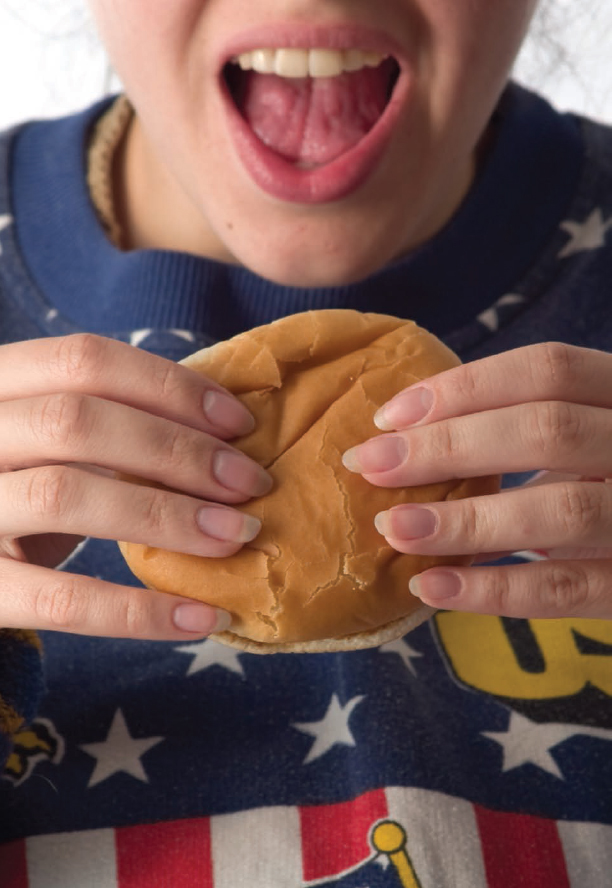
Words to Understand

corporations: Businesses made up of groups of people authorized to act as a single body.
assembly line: An arrangement of machines and workers in which a task moves from operation to operation until it is complete.
conglomerate: A mass formed of diverse things or parts.
mass-produced: Made in large quantities at a time.
entrepreneurs: People who start their own businesses.
franchises: Individuals or groups who have been given permission by a company to sell its goods or services.
uniformity: The state of being the same, consistent, or unchanging.
dehydrating: Preserving food by removing the moisture from it; drying.
sociologist: Someone who studies the development, structure, interaction, and collective behavior of organized groups of human beings.
inherently: At the core; essentially; naturally.
perpetuated: Aided or helped to continue.
The Birth of
a Nation?
 America's Obesity Crisis
America's Obesity Crisis
Look around. The signs are everywhere: theyre in the headlines of newspapers, the titles of bestselling books, the lead stories on the nightly news, and the bodies of people all around you. In America today, obesitythe state of being very overweightis not simply a problem, its a national crisis.
Think thats an exaggeration? Its not. Two out of every three American adults are overweight, with one out of three officially obese. And adults arent the only ones suffering. One out of every six people between the ages of six and nineteen is also overweight, with an additional one out of six in danger of becoming overweight. The numbers (along with our waistlines) are still growing. Experts now fear that obesity will soon be even more than a crisis; it will be the American way of life.
So how did Americans get to be the heaviest people on earth? Are individuals to blame for ballooning buttocks and walloping waistlines? Are Americans more irresponsible than people of all other societies? Do we care less about our health than anyone else? If American obesity rates increase every year, does that mean that each year we become less and less concerned with the way we eat, feel, and look?
On the one hand, as the heads of fast food and their marketing groups love to remind us, we do make our own personal decisions every time we put a piece of food into our mouths or decide to watch television instead of take a walk. On the other hand, Americans certainly have not decided that they want to be obese. In fact, each year Americans pour billions of dollars into trying to lose weight. We might be the heaviest people in the world, but we also spend the most money trying to slim down.
So why cant we? Why does the obesity crisis keep looming larger? Why are young people now gaining weight at an astonishing rate when they are constantly bombarded by images telling them to be impossibly beautiful and impossibly thin? Clearly, there are other forces at work: forces that encourage us to make unhealthy lifestyle choices, forces that sometimes make it impossible to do anything else.
Although there are a number of factors behind Americas bulging bodies, fast food is one of the biggest. In this book, we will explore fast foods role in the American obesity crisis. Along the way, you will learn how the fast-food industry has shaped not only our bodies but our society. Many experts agree: we Americans do not simply eat fast foods. We lead fast-food lifestyles, and this is killing us.
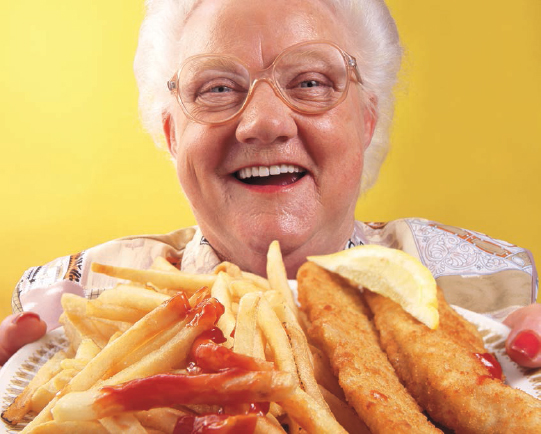

Next page
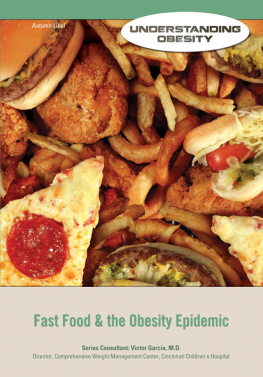


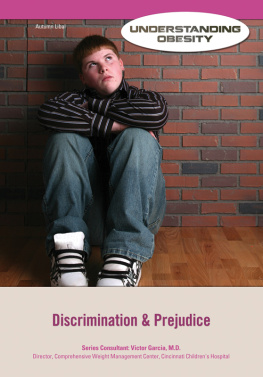
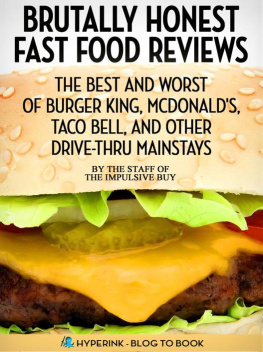

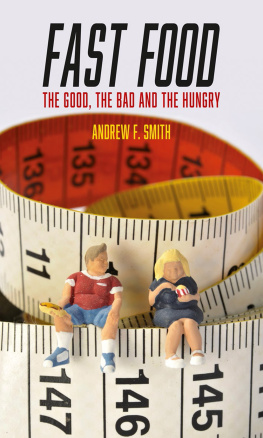

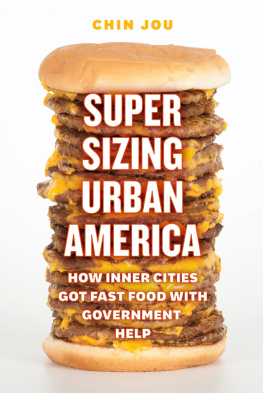
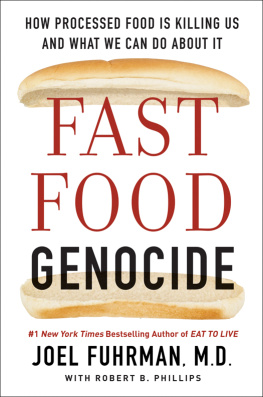









 America's Obesity Crisis
America's Obesity Crisis
